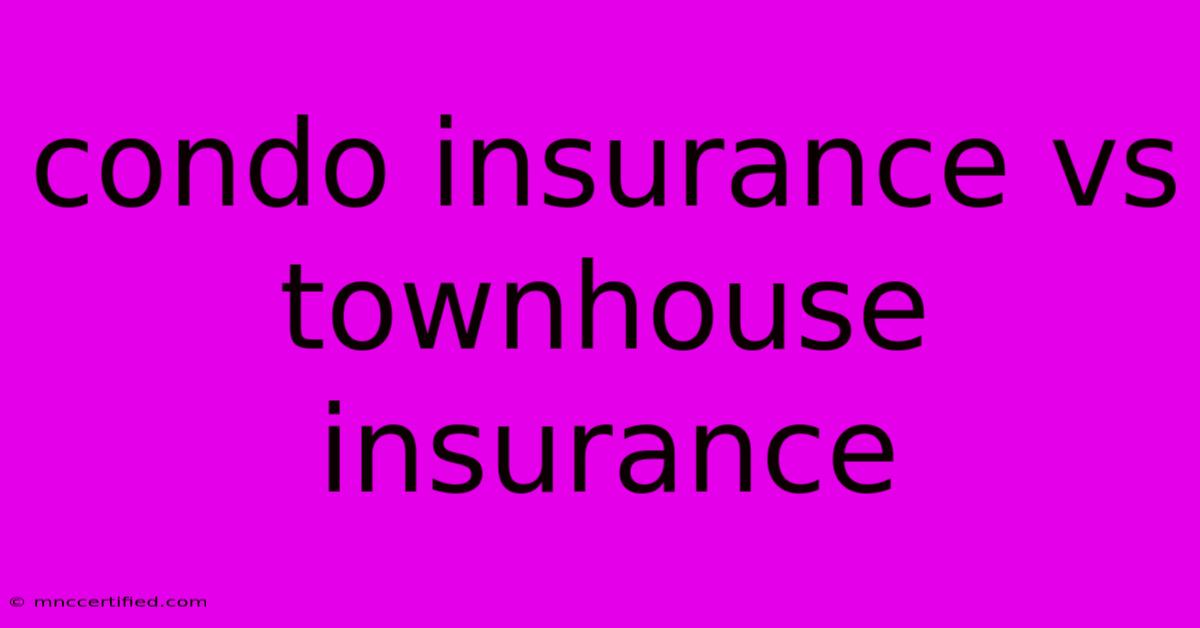Condo Insurance Vs Townhouse Insurance

Table of Contents
Condo Insurance vs. Townhouse Insurance: What's the Difference?
Owning a condo or townhouse is a dream for many, but it's crucial to understand the nuances of insurance coverage for these types of properties. While both involve shared ownership and common areas, there are distinct differences in insurance needs. This article will explore the key distinctions between condo insurance and townhouse insurance, helping you make informed decisions about your coverage.
Understanding Condo Insurance
Condo insurance, also known as HO6 insurance, is designed to protect your individual unit within a multi-unit building. It typically covers:
- Personal property: This includes your belongings, such as furniture, electronics, clothing, and artwork.
- Personal liability: This protects you from financial losses arising from accidents or injuries that occur within your unit.
- Loss of use: This covers expenses incurred when your unit is uninhabitable due to a covered event, such as fire or flood.
Important Note: Condo insurance doesn't cover the building's structure or common areas. That responsibility falls on the condominium association, which typically maintains a master insurance policy.
Understanding Townhouse Insurance
Townhouse insurance, commonly known as HO-2 or HO-3, is similar to homeowner's insurance for single-family homes. It provides broader coverage, including:
- Structure coverage: This protects the physical structure of your townhouse, including walls, roof, and foundation.
- Personal property: Similar to condo insurance, this covers your belongings.
- Personal liability: This protects you from financial losses due to accidents or injuries on your property.
- Loss of use: This covers expenses incurred when your townhouse is uninhabitable.
Key Difference: Townhouses are typically considered "attached" dwellings, meaning they share a common wall with neighboring units. Therefore, townhouse insurance covers the structure of your unit, unlike condo insurance.
What to Consider When Choosing Coverage
Here are some factors to consider when deciding on the right insurance policy:
- Condominium Association's Master Policy: Review the master policy to understand what's covered and what's excluded. This will help you determine what additional coverage you might need.
- Your Personal Needs: Consider your specific belongings and potential risks. If you own valuable items, you might need increased coverage limits.
- The Cost of Replacement: Factor in the cost of replacing your belongings and repairing or rebuilding your unit. Choose coverage that aligns with your budget.
- Deductible: A higher deductible typically means lower premiums, but you'll pay more out-of-pocket in the event of a claim.
Getting the Right Insurance Coverage
To ensure you have adequate protection, it's essential to:
- Shop Around: Get quotes from multiple insurance providers to compare coverage options and prices.
- Consult with an Insurance Agent: Discuss your specific situation with an experienced agent to find the most suitable policy.
- Review Your Policy Regularly: Make sure your coverage aligns with your current needs and adjusts as your assets change.
Remember: Both condo and townhouse insurance policies can be customized to meet your individual requirements. By understanding the differences and carefully considering your needs, you can choose the best coverage for your precious investment.

Thank you for visiting our website wich cover about Condo Insurance Vs Townhouse Insurance. We hope the information provided has been useful to you. Feel free to contact us if you have any questions or need further assistance. See you next time and dont miss to bookmark.
Featured Posts
-
Florida Basketball Coach Accused Sexual Assault
Nov 09, 2024
-
Iowa Vs Ucla Betting Preview 2024 Game Odds
Nov 09, 2024
-
Iowa Vs Ucla Prediction College Football Picks
Nov 09, 2024
-
How To Watch 76ers Vs Lakers Game Live
Nov 09, 2024
-
2036 Olympics Indias Bid
Nov 09, 2024